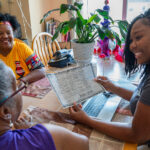What is RSV infection?
Respiratory syncytial virus (RSV) is a respiratory infection most common in the fall and winter. For most healthy people, it causes mild, cold-like symptoms and goes away on its own. Like a cold, it’s very common and spreads quickly. Most children have had RSV at least once by age two. However, RSV can be serious for some people, particularly young infants (especially under six months), some children and older adults. It is the most common reason for hospitalization in young infants and causes more than 100,000 older adults in the U.S. to be hospitalized each year.
Schedule your vaccines with a ChristianaCare primary care provider here or call 302-777-0643.
What are the symptoms of respiratory syncytial virus (RSV) infection?
RSV usually causes the same symptoms as a cold, such as:
- Coughing and sneezing
- A stuffy or runny nose.
- Decreased appetite.
- A mild sore throat.
- A low-grade fever.
In adults, RSV may lead to worsening of other medical conditions:
- Asthma.
- Chronic obstructive pulmonary disease (COPD).
- Heart failure (CHF).
Young babies with RSV may also:
- Have a decreased interest in their surroundings.
- Have low energy, listless and sleepy.
- Act fussy or cranky.
- Not sleep well.
- Eat and drink less than usual.
- Have apnea, where breathing stops for more than 10 seconds., or other breathing difficulties.
Some children have other severe symptoms, like wheezing. Call your provider if your child is wheezing or having trouble breathing.
RSV infection sometimes leads to bronchiolitis (inflammation of the small airways in the lung), pneumonia (infection of the lungs), or both. Symptoms may be similar to influenza (the flu) or COVID-19.
RSV may be fatal for both adults and children.
What causes RSV infection?
As the name suggests, RSV is caused by a virus. Like the common cold virus, RSV infects your nose and throat but can also affect your lungs and breathing passages. There are two main types of RSV (RSV-A and RSV-B) and many subtypes (strains). Both can cause mild or severe disease. Because of this variability, you can get RSV many times throughout your life.
Did you know the world’s first successful vaccine was created in 1796? Tune in to learn more about this with Dr. Drees and Dr. Stephen Eppes on the For the Love of Health podcast!
How is RSV infection diagnosed?
Providers may suspect RSV based on your symptoms and knowing whether there’s an RSV outbreak in your area. RSV outbreaks are most common in the fall and winter.
There are tests for RSV, but they usually aren’t needed for mild disease. Suppose you need to go to an Emergency Department or hospital because of your symptoms. In that case, you will typically be tested for flu, RSV and COVID-19 (depending on the season) using a swab of secretions inside the mouth or nose.
The results of viral detection tests help providers know if precautions are needed to prevent the spread of infection. For those at risk of getting severe infections or complications of RSV infections, the results of these tests can help guide treatment.
Other specific tests may be needed if RSV symptoms don’t improve, if they get worse, or if complications such as bronchiolitis or pneumonia are suspected. These tests may include:
- Chest X-ray.
- Blood tests.
- Pulse oximetry (measuring the oxygen level in your blood).
How are RSV infections treated?
Because it’s a virus, antibiotics don’t help RSV get better. Unlike the flu and COVID-19, there aren’t any specific anti-viral medications that can be taken. Usually, RSV goes away on its own and treatment of symptoms is all that’s needed. Symptoms typically improve in a week or two.
If your child has RSV:
- Make sure they drink plenty of fluids.
- Use saline nose drops and suction their nose if they can’t breathe well enough to eat or sleep.
- You may give your child acetaminophen (Tylenol) for fever or to make them more comfortable. Be safe with medicines. Read and follow all instructions on the label. Do not give combination “cold/flu” medicines to children; never give aspirin to someone younger than 20 years old. It can cause Reye syndrome, a severe illness.
- Watch for signs of dehydration (loss of body fluids), such as dry mouth, little to no urine output, sunken eyes, and extreme fussiness or sleepiness.
If the RSV infection is severe, a hospital stay may be necessary. Treatments at the hospital may include intravenous (IV) fluids, oxygen, and, rarely, a breathing machine (ventilator).
How does respiratory syncytial virus (RSV) infection spread?
RSV is very contagious. This means that it spreads quickly from person to person.
People with RSV infection may spread the virus through their secretions (saliva or mucus) when they cough, sneeze, talk, or share food or drink. You can also catch the virus by:
- Touching an object or surface with the virus and then touching your nose, eyes, or mouth without first washing your hands. The virus can survive for over six hours on countertops and other hard surfaces, such as doorknobs, and for 30 minutes on hands, clothing, or tissue.
- Close contact. If an infected person coughs or sneezes near you, you could breathe in RSV in that person’s saliva or mucus.
The virus spreads quickly in crowded settings, such as childcare centers, preschools, and nursing homes. Children who go to school can spread the virus to their parents and siblings.
How can you prevent RSV infection?
Until recently, preventing RSV has been very hard, just like avoiding catching a cold. Everyone can lower their chances of getting RSV by practicing good health habits. Wash your hands often, cover your mouth/nose when you cough or sneeze with a tissue or arm, and teach children to do the same.
Last year, new immunizations became available to prevent severe RSV in those most at risk: young infants and older adults:
- All adults 75 years and older should get one of the new RSV vaccines.
- Adults aged 60-74 years with other underlying health conditions such as chronic kidney disease, heart or lung disease, a weakened immune system, and others (see: RSV Vaccine Guidance for Older Adults | RSV | CDC ) should also get one of the new RSV vaccines.
- ALL young infants are recommended to be protected by one of two options (not both):
- Mothers can get one of the RSV vaccines (Pfizer’s Abrysvo) during weeks 32-36 of pregnancy to provide their babies with protective antibodies as soon as they are born or…
- Infants under eight months of age can receive an immunization (nirsevimab) that provides protective antibodies to them directly. They can get this within the first week of life (if they are born during RSV season, October-March) or at their pediatrician’s office if they were born in April through September.
- Certain children with chronic medical problems may be recommended to get nirsevimab during their 2nd RSV season.
Stay on top of your shots!
Manage your vaccines for your entire lifetime, not just when you’re young. Most of the vaccines you received when you were younger will protect you, but adults of all ages must keep up with them to remain healthy. As adults age, their immune system weakens, and they may need boosters to prevent infection and complications. The lifelong love of your health is worth the effort. Remember, our experts are here to help you stay on track. To learn more or schedule an appointment, contact a primary care provider at ChristianaCare online or call 302-777-0643.



